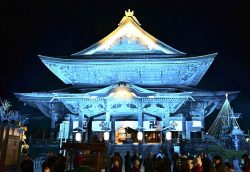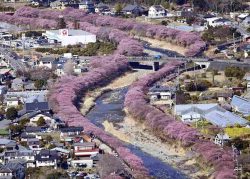
A Kurabito Stay tour participant drinks mineral water in Saku, Nagano Prefecture.
13:35 JST, March 7, 2025
Travel destinations striving to promote DEI (diversity, equity and inclusion) and sustainability in the tourism industry were recently honored at the 2025 Japan Travel Awards, with this year’s winners ranging from a sake-making experience at a centuries-old brewery to barrier-free marine sports.
Winners gathered at the Tokyo American Club in Minato Ward, Tokyo, in February for the awards ceremony. A total of 196 entries were submitted for the 2025 awards, with prizes awarded in 11 categories.
“I think it’s fair to say that diversity is not only important, it is the most beautiful thing because it brings people together for all the right reasons,” said Ally Hongo, cofounder of Shiitake Creative Inc., the creative agency that launched the awards. “The same is true for travel, which in essence is the most diverse industry that has ever existed.”
Become a sake brewer
The 2025 Grand Prix went to Kurabito Stay in Saku, Nagano Prefecture, which allows visitors to experience the work of a kurabito, or sake brewer, at the more than 300-year-old Kitsukura Sake Brewery. Guests can learn about and participate in various parts of the sake-making process — foreign visitors are aided by simultaneous English interpretation, as well as videos and text — and stay overnight in a renovated building where brewers once slept.
Founder Marika Tazawa was partly motivated to launch Kurabito Stay by the effect of her first pregnancy on her job in wine imports. When her supervisor learned of her condition, she was removed from outside sales duties and instead spent her days on tasks like wiping wineglasses and cutting out articles from magazines.
“I felt keenly, ‘Why can men become fathers at any time, but when women get pregnant or are raising children, their labor productivity is suddenly considered to be low. Why does Japanese society lower women’s value in this way?’” Tazawa said.
Aiming for a more accommodating workplace, Kurabito Stay offers its sake-making experiences on Fridays through Sundays. By limiting the presence of guests to weekends, Tazawa sought to “create a place where women like me who are raising children would also find it easy to work and could utilize their particular skills,” she said. Among her staff are a woman whose 3-year-old child often accompanies her to work and an 84-year-old who comes to make breakfast.
Kurabito Stay has also established a network of collaborating restaurants for lunch and dinner, helping to train them in welcoming foreign guests and providing bilingual menus in Japanese and English. “They look forward to it, wondering, ‘What country will people come from this weekend?’” Tazawa said.
The duality of kendo
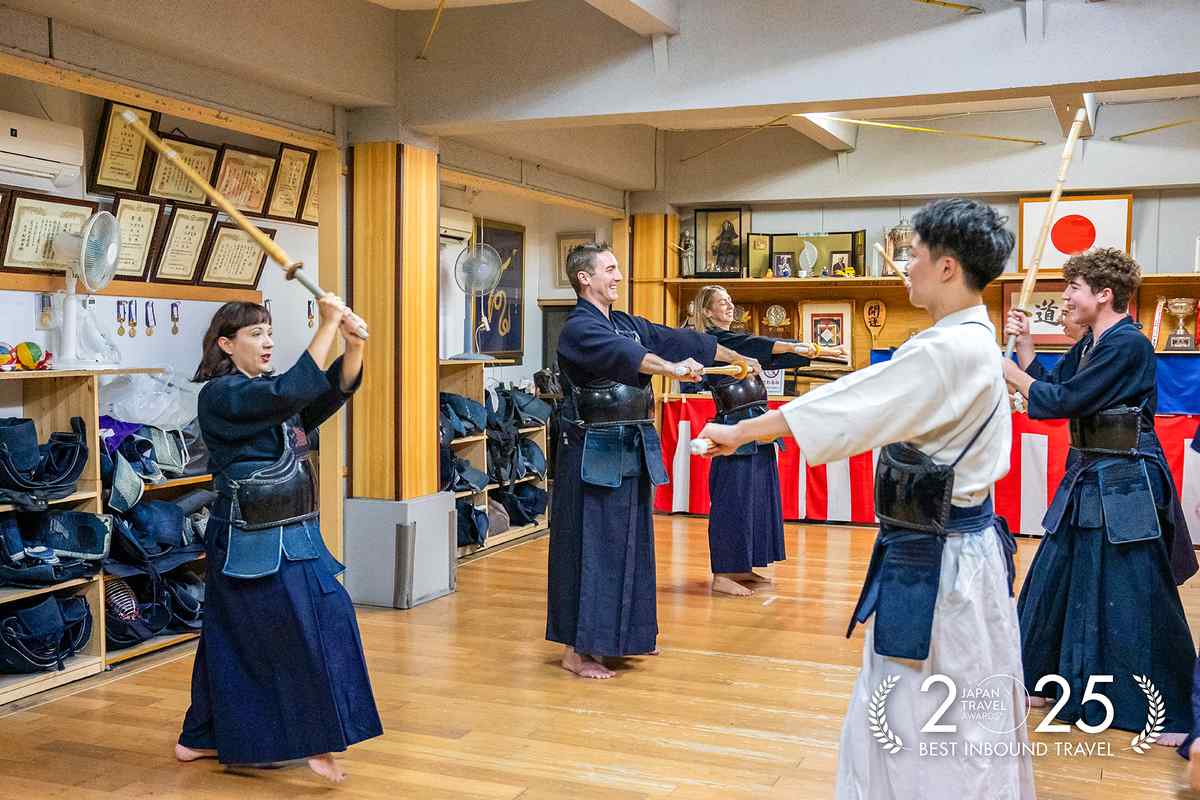
Guests learn kendo techniques at a Samurai Trip Kendo Experience Tour workshop in Tokyo.
Also catering to foreign guests is the Samurai Trip Kendo Experience Tour, which was awarded the 2025 prize for best inbound travel. Operating in a number of major cities, Samurai Trip allows participants to don traditional kendo gear and be instructed in both fighting technique and the etiquette of the sport.
According to founder Kenshi Nagamatsu, the domestic business environment for makers of kendo gear is extremely severe — about 90% is manufactured overseas. With prices dropping and many makers going out of business, Nagamatsu launched Samurai Trip in the hope that inbound visitors could help bring money into the field.
The service can accommodate parties ranging from just two people to hundreds — Nagamatsu recalled the largest group so far as numbering about 250 employees of an insurance company. Guests particularly enjoy the chance to actually spar, he felt, as opposed to simply pose for photos.
“I want them to feel the dual nature of kendo,” said Nagamatsu, whose own training began at the age of 5. “How the thrill of the fighting is combined with the civility.”
Where milk comes from
The Iga no Sato Mokumoku Tezukuri Farm in Iga, Mie Prefecture, was given the 2025 award for best family travel for its efforts to teach children “the importance of understanding, valuing and coexisting with our natural surroundings.”
Visitors can interact with such animals as goats, cows and horses, and try their hand at making foodstuffs including sausages, bread and ice cream. The farm’s operators hope such activities will help children think more critically about topics like the origin of their food. According to Hongo of Shiitake Creative, her 5-year-old son said after visiting that he now understands how much effort it takes for the cows to produce even one cup of milk, and he no longer leaves his milk unfinished.
Accommodations are also available at the farm, including eight “kids’ cottages” with soft floors and other features particularly geared toward children. Guests staying overnight can assist with a variety of morning chores depending on the season.
According to Koya Komatsu of the farm’s operational department, the fact that most often draws surprise from both children and adults is that milk only comes from female cows who have given birth. “Some people think milk will come out of any cow,” Komatsu said. He also recalled a primary school student who thought that “coffee milk” would emerge from brown Jersey cows.
Upcycling clothes
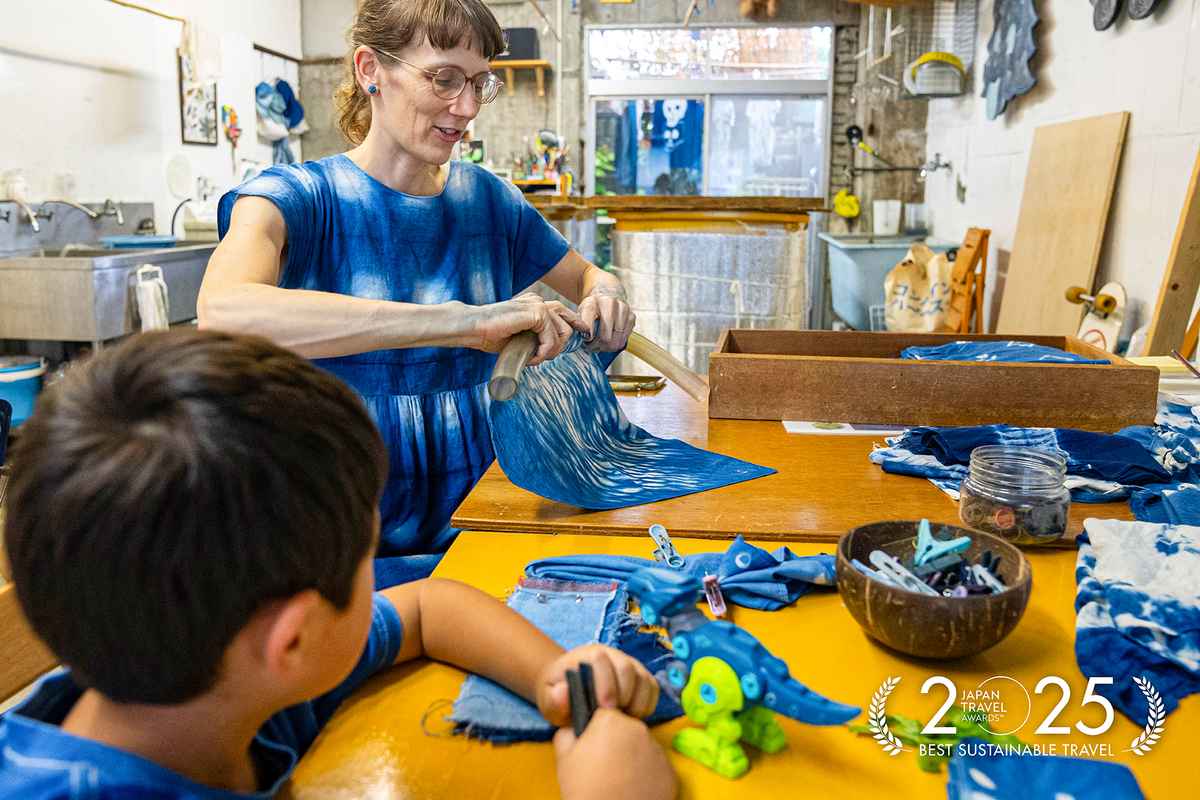
Cofounder Sally Hancox demonstrates indigo dyeing at Natural Indigo Dye Studio AiAii in Sumoto, Hyogo Prefecture.
The 2025 prize for best sustainable travel went to Natural Indigo Dye Studio AiAii in Sumoto, Hyogo Prefecture, a facility on Awaji Island that grows and ferments its own indigo plants.
The Japan Travel Awards praised its success in creating an experience that is “educational, entertaining and fulfilling … AiAii’s services inspire a reexamination of the excessive waste in the fashion industry and promote alternative, creative solutions to reduce pollution.”
Visitors can learn about the various steps of the dyeing process in bilingual Japanese-English workshops, and dye a variety of items including T-shirts, tote bags and scarfs.
Guests are also encouraged to bring their own cotton or linen clothes to be upcycled. “When they take that item home, it’s a souvenir that’s really a treasure because it’s a memory of their experience, but it connects to the history and the culture and the place,” said cofounder Sally Hancox.
“Not only is it a beautiful item, but I hope that when you start re-dyeing your clothes, you might think about other ways that you consume clothes or things … and try to make it more sustainable,” Hancox said.
The power of one
The 2025 prize for best accessible travel went to wildwater, a barrier-free outdoor tour operator on Lake Biwa in Otsu.
“Tour participants with mobility impairments can experience various lake activities previously inaccessible in the region,” the awards said. “Although wildwater is still a small business, it demonstrates that meaningful change can start with the idea and action of one.”
The idea for wildwater came from Takehito Kano, a former firefighter whose work often brought him into contact with physically impaired people. During a trip to Lake Biwa, Kano was struck by how freely he and his family could enjoy themselves and wanted to help people with mobility impairments experience the same fun.
Guests can engage in pursuits including snorkeling, paddle boarding and kayaking, with Kano drawing on such resources as his rescue ropework skills and harness equipment to move people needing assistance. That equipment is attached to a boat Kano imported from the United States, chosen from the offerings of about 20 U.S. companies both for its sturdiness and cool factor.
“I want people to be able to enjoy themselves in style,” he said.
Real life in Niigata
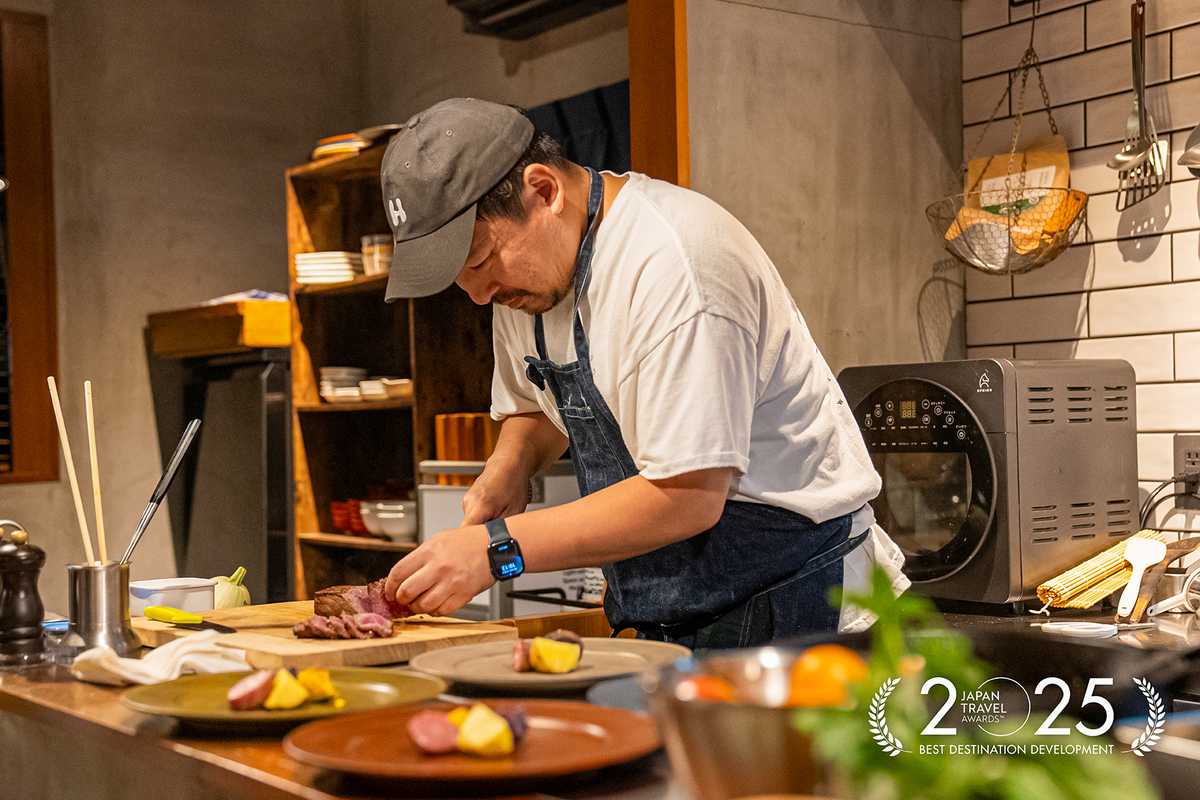
Chef-owner Sho Suzuki prepares food at Hakko House Nagaoka guesthouse in Nagaoka, Niigata Prefecure.
The Hakko House Nagaoka guesthouse in Nagaoka won the award for best destination development, praised for its efforts to promote the food fermentation culture of Niigata Prefecture.
“In recent years, with advances in frozen foods and better distribution, food and other things throughout Japan have become more uniform,” said owner-chef Sho Suzuki. As a result, primary industries and the use of traditional fermentation techniques for things like sake and miso are declining, he said.
Alarmed at this trend, Suzuki launched Hakko House Nagaoka. In addition to savoring dishes presented by the chef as he explains the cultural background and local history behind them, guests have the option to harvest local ingredients with Suzuki and prepare them together. Suzuki can also direct them to local stores, after which guests can prepare food on their own in the professional-grade kitchen.
“I want guests to see and experience our daily lives,” Suzuki said, including morning walks through the beautiful scenery of local fields. “Instead of regional areas putting on a special welcome because visitors have come, I want to show them reality. I want to give value to that.”
The overnight accommodations at Hakko House Nagaoka feature local materials and art, such as Echigo cedar and shoji screens fashioned from handmade washi paper from Nagaoka.
Welcome all year round
The 2025 award for Best LGBTQ+ travel was given to Ace Hotel Kyoto, honored for “their commitment to creating an engaging environment for all guests and members of the LGBTQ+ community.”
The first Ace Hotel in Asia, Ace Hotel Kyoto is dedicated to welcoming LGBTQ+ guests all year round, not just during Pride Month in June, said general manager Shiho Ikeuchi.
In addition to physical manifestations such as a Pride flag at the front desk and many staff wearing badges from the International LGBTQ+ Travel Association — of which Ikeuchi is a board member — Ace Hotel Kyoto strives to ensure that its employees are trained to be inclusive and welcoming.
“People that don’t think two men can be a couple will do things like ask a male couple that reserved a double: ‘We have a twin available; shall we change you to that? You’ll need two beds, right?’” Ikeuchi said. To help avoid such situations, training for new employees includes LGBTQ+-related matters.
Among other inclusivity efforts, Ace Hotel Kyoto’s rooms are free of level differences in the floors, to ensure accessibility, and its main restaurant provides vegan offerings.
Special recognition awards
A special recognition award for best cultural travel was given to Templestay Zenso, a guesthouse connected with the 700-year-old Horinji Temple in Chiyoda, Gunma Prefecture. Visitors can participate in such temple activities as meditation, copying sutras and morning prayers.
The awards’ website praised Templestay Zenso for blending “tradition and modernity, comfort and excitement, and familiarity and novelty, all wrapped in a refreshing and well-rounded cultural experience. The monk’s passion and dedication to revitalizing the town and making Buddhism and its traditions more accessible to the regular traveler are inspiring.”
Treeful Treehouse Sustainable Resort in Nago, Okinawa Prefecture, was presented with a special recognition prize for best luxury experience. The first — and at present only — treehouse hotel in Japan, the facility is located in the Yanbaru Forest.
“Waking up to the sounds of rustling leaves, chirping birds, and flowing rivers while resting your head on tree branches is a truly unforgettable experience,” the awards’ website said. “Guests can indulge in the rare luxury of finding peace among nature’s many blessings in this truly outstanding accommodation.”
A special recognition prize for best social impact went to the ume, yamazoe inn in Yamazoe, Nara Prefecture, a modern inn renovated from an old private home. The facility was recognized for “its efforts to break down multiple barriers in the tourism industry and transform what we often perceive as ‘impossible’ in the tourism industry into reality.”
Through its HAJIMARI Project, the inn provides a complimentary stay for at least 12 families each year, with at least one member living with a disability or severe illness.
The Hakone Honbako hot spring retreat in Hakone, Kanagawa Prefecture, was awarded a special recognition prize for best accommodation. In addition to meals “thoughtfully connected to the hotel’s historical roots and local culture,” Hakone Honbako was praised for its library of more than 12,000 books, which can be read and/or purchased on site and its children’s events held several times a year.
Top Articles in Features
-

Tokyo’s New Record-Breaking Fountain Named ‘Tokyo Aqua Symphony’
-

Sapporo Snow Festival Opens with 210 Snow and Ice Sculptures at 3 Venues in Hokkaido, Features Huge Dogu
-

Tourists Flock to Ice Dome Lodge at Resort in Hokkaido, Japan; Facility Invites Visitors to Sleep on Beds Made of Ice
-

High-Hydration Bread on the Rise, Seeing Increase in Specialty Shops, Recipe Searches
-

Heirs to Kyoto Talent: Craftsman Works to Keep Tradition of ‘Kinran’ Brocade Alive Through Initiatives, New Creations
JN ACCESS RANKING
-

Japan PM Takaichi’s Cabinet Resigns en Masse
-

Japan Institute to Use Domestic Commercial Optical Lattice Clock to Set Japan Standard Time
-

Israeli Ambassador to Japan Speaks about Japan’s Role in the Reconstruction of Gaza
-

Man Infected with Measles Reportedly Dined at Restaurant in Tokyo Station
-

Videos Plagiarized, Reposted with False Subtitles Claiming ‘Ryukyu Belongs to China’; Anti-China False Information Also Posted in Japan


